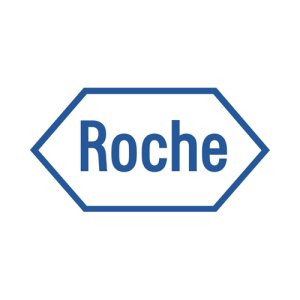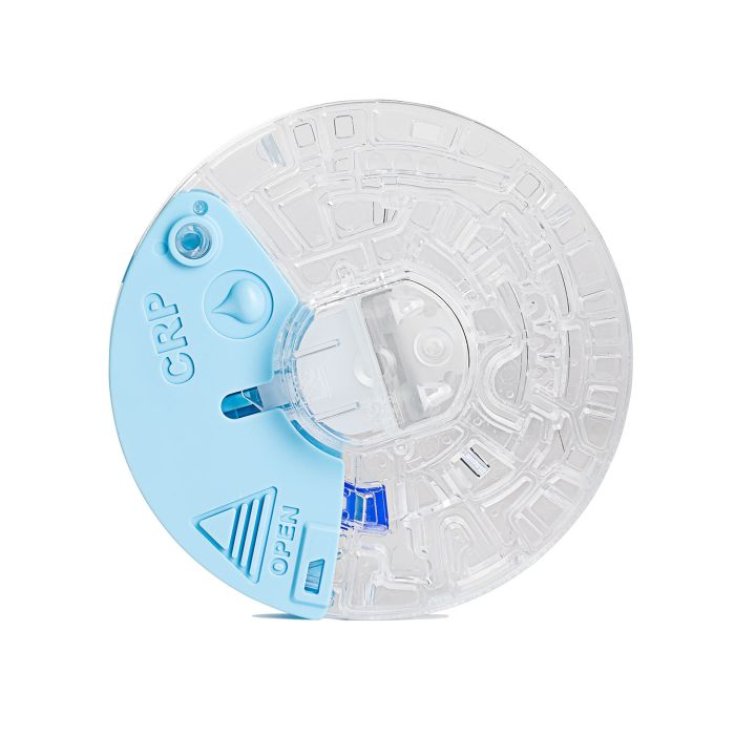COBAS B101 CRP TEST 10PCS
139.87€

- Brand: ROCHE DIAGNOSTICS SpA
- Product Code: 983533783
- EAN: 7613336118832
- Availability: In Stock
- Purchase 3 items for 137.07€ each
- Purchase 4 items for 134.28€ each
- Purchase 5 items for 131.48€ each
cobas CRP Test
Description
System for in vitro diagnostic tests intended for the quantitative determination of C-reactive protein (CRP) in human whole blood and serum from capillary sampling as well as in whole blood and plasma treated with the anticoagulants K2/K3-EDTA and lithium heparin by means of photometric measurement.
CRP measurement is useful for the evaluation of inflammatory states and associated diseases, infections and tissue injuries.
The erythrocytes contained in the capillary or venous blood sample are separated from the plasma by centrifugation. Subsequently, the plasma sample is diluted with HEPES buffer and transferred to a reaction chamber, where it is mixed with anti-PCR-latex antibody reagent. The CRP present in the diluted plasma binds to the anti-PCR antibody on the latex particle.
The PCR concentration is calculated as a function of the changed absorbance measured at 525 nm and 625 nm, which correlates with the amount of agglutination.
The system is intended for use in Point of Care (POC) locations, such as pharmacies, doctor's offices, ambulatory laboratories, clinics, and hospitals, as well as in clinical laboratories.
How to use
Use of reagents
Carefully tear the foil bag at the notch until it is open on one side. Discard the disc if the foil pouch is already open or damaged, if the disc is damaged, if desiccant is missing, or if you find loose desiccant particles or any other dirt or particles especially in the blood reaction zone.
Use the cobas CRP Control using the same procedure as for a blood sample.
Sample collection and preparation
For specimen collection and preparation, use only suitable test tubes or collection containers.
Use fresh human capillary whole blood or serum, whole blood or plasma treated with the anticoagulants K2/K3-EDTA or lithium heparin. Do not use other anticoagulants or other additives.
For whole blood and plasma samples treated with the K2/K3-EDTA and lithium heparin anticoagulants, test within 8 hours of sample collection when stored at room temperature.
If stored in a refrigerator, plasma samples can be used for up to 14 days and whole blood samples for up to 3 days.
Serum and plasma samples frozen and stored at -20°C can be used for up to 30 days.
Freeze only 1 time.
Mix the sample thoroughly before use. Do not use frozen whole blood to avoid the risk of haemolysis.
The marking on the disc indicates where the sample should be applied. If samples were collected by venipuncture or from control material, use a standard pipette or dropper pipette to form a drop.
The disc is self-filling.
Do not push the sample into the disc.
Do not use syringes.
Make sure there is no blood on the disc outside the sample reaction zone or on the outside of the hinged lid.
After applying the sample, the disc should be inserted immediately (within ≤120 seconds). Proceed according to the instructions in the cobas b 101 system user manual.
Execution
Wash your hands with soap. Warm water is used to stimulate blood flow. Rinse fingers thoroughly. Dry your hands thoroughly.
Disinfect the fingertip by wiping the puncture area 3 times with a sterile cotton or gauze swab, impregnated with 70-100% isopropanol, free of emollients, or 70-100% diethanol, free of emollients; repeat the procedure with a second sterile cotton or gauze swab, impregnated with isopropane
System for in vitro diagnostic tests intended for the quantitative determination of C-reactive protein (CRP) in human whole blood and serum from capillary sampling as well as in whole blood and plasma treated with the anticoagulants K2/K3-EDTA and lithium heparin by means of photometric measurement.
CRP measurement is useful for the evaluation of inflammatory states and associated diseases, infections and tissue injuries.
The erythrocytes contained in the capillary or venous blood sample are separated from the plasma by centrifugation. Subsequently, the plasma sample is diluted with HEPES buffer and transferred to a reaction chamber, where it is mixed with anti-PCR-latex antibody reagent. The CRP present in the diluted plasma binds to the anti-PCR antibody on the latex particle.
The PCR concentration is calculated as a function of the changed absorbance measured at 525 nm and 625 nm, which correlates with the amount of agglutination.
The system is intended for use in Point of Care (POC) locations, such as pharmacies, doctor's offices, ambulatory laboratories, clinics, and hospitals, as well as in clinical laboratories.
How to use
Use of reagents
Carefully tear the foil bag at the notch until it is open on one side. Discard the disc if the foil pouch is already open or damaged, if the disc is damaged, if desiccant is missing, or if you find loose desiccant particles or any other dirt or particles especially in the blood reaction zone.
Use the cobas CRP Control using the same procedure as for a blood sample.
Sample collection and preparation
For specimen collection and preparation, use only suitable test tubes or collection containers.
Use fresh human capillary whole blood or serum, whole blood or plasma treated with the anticoagulants K2/K3-EDTA or lithium heparin. Do not use other anticoagulants or other additives.
For whole blood and plasma samples treated with the K2/K3-EDTA and lithium heparin anticoagulants, test within 8 hours of sample collection when stored at room temperature.
If stored in a refrigerator, plasma samples can be used for up to 14 days and whole blood samples for up to 3 days.
Serum and plasma samples frozen and stored at -20°C can be used for up to 30 days.
Freeze only 1 time.
Mix the sample thoroughly before use. Do not use frozen whole blood to avoid the risk of haemolysis.
The marking on the disc indicates where the sample should be applied. If samples were collected by venipuncture or from control material, use a standard pipette or dropper pipette to form a drop.
The disc is self-filling.
Do not push the sample into the disc.
Do not use syringes.
Make sure there is no blood on the disc outside the sample reaction zone or on the outside of the hinged lid.
After applying the sample, the disc should be inserted immediately (within ≤120 seconds). Proceed according to the instructions in the cobas b 101 system user manual.
Execution
Wash your hands with soap. Warm water is used to stimulate blood flow. Rinse fingers thoroughly. Dry your hands thoroughly.
Disinfect the fingertip by wiping the puncture area 3 times with a sterile cotton or gauze swab, impregnated with 70-100% isopropanol, free of emollients, or 70-100% diethanol, free of emollients; repeat the procedure with a second sterile cotton or gauze swab, impregnated with isopropane

